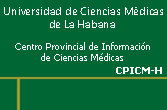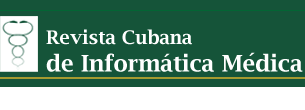



|
Universidad de Ciencias Médicas de Matanzas “Dr. Juan Guiteras Gener”
Lic. Ángela Ojeda Cabrera 1 1 Licenciada en Matemáticas. Profesor Auxiliar. Universidad de Ciencias Médicas de Matanzas “Dr. Juan Guiteras Gener”. Matanzas, Cuba.
Se exponen valoraciones acerca del diseño de la asignatura Informática Médica II que se imparte en el cuarto semestre de la carrera de Medicina; se profundiza en el análisis del sistema de conocimientos desde la teoría didáctica, así como en su relación con el sistema de objetivos y métodos y se presentan algunas reflexiones acerca de la contribución de la asignatura al desarrollo de habilidades investigativas en los estudiantes. Se concluye que el programa responde en sentido general al propósito de formar un Médico General Integral Básico capaz de proceder organizada y reflexivamente en el tratamiento estadístico y computacional de la información médica, así como de identificar los métodos más comunes de la estadística inferencial para la solución de problemas biomédicos. Sin embargo, se considera que el tiempo previsto para la formación de habilidades investigativas generales (establecimiento del marco teórico, formulación de problemas, objetivos e hipótesis), resulta insuficiente. Palabras clave:
diseño curricular, objetivos, contenido, habilidades, métodos de enseñanza, sistema de evaluación, habilidades investigativas. An assessment of the curriculum of Medical Informatics II taught to students in the forth term of their medical studies is discussed, where the analysis of the system of knowledge is emphasized through the didactic theory, as well as its relation to the system of objectives and methods and some comments about this subject matter contribution to the development of students’ researching skills. It is generally concluded that the syllabus answers to the purpose of forming a Basic Integrated General Doctor, who’s able to reflectively organize the statistical and computational medical information, and identify as well the most usual methods from inferential statistic for the solution of biomedical problems. However, it is our consideration that the time established for the formation of general researching abilities, that is the setting of the theoretical background, the formulation of problems, objectives and hypothesis, turns out to be insufficient. Key words: teaching strategy, objectives, content, teaching methods, assessment system.
|